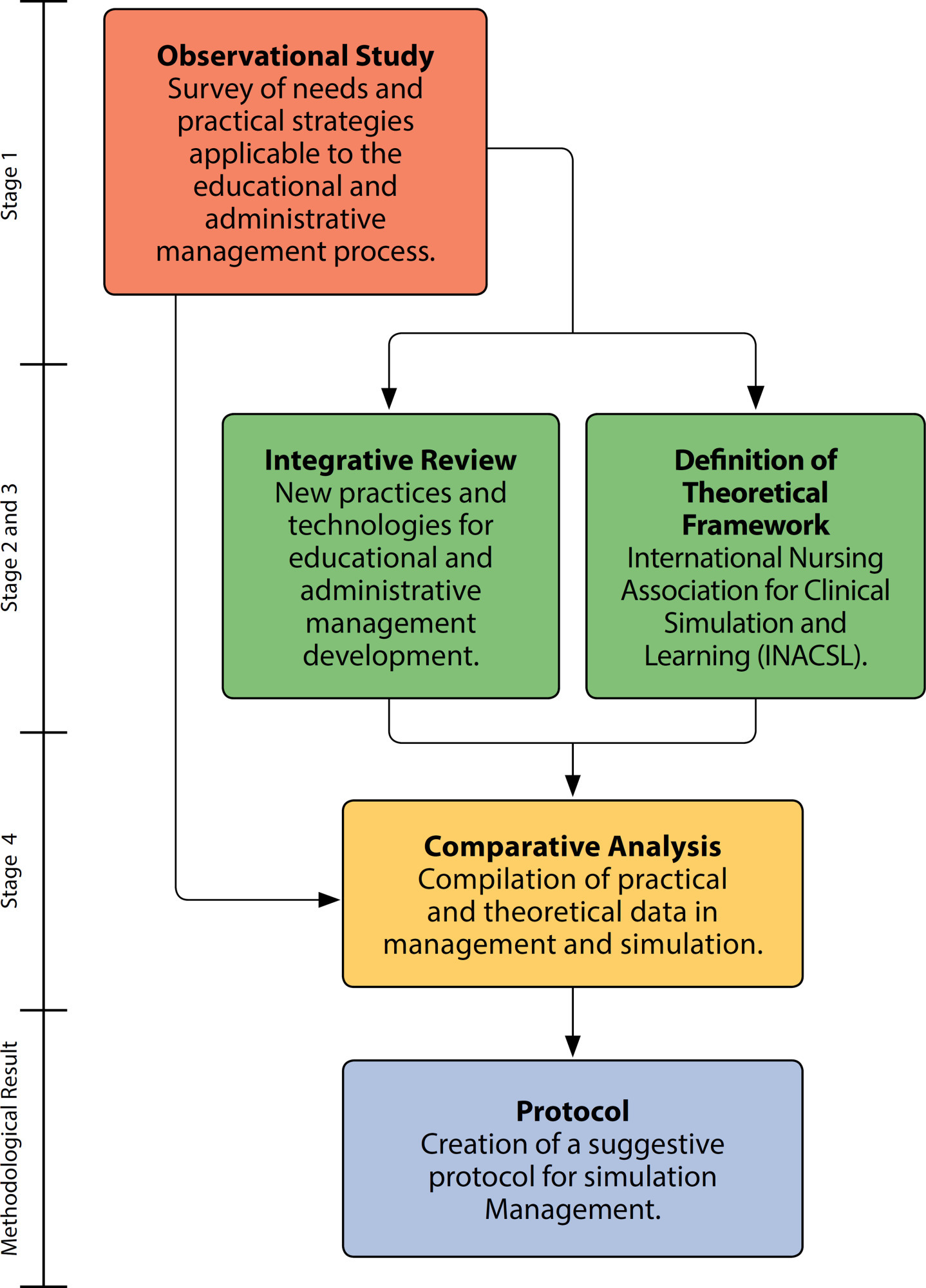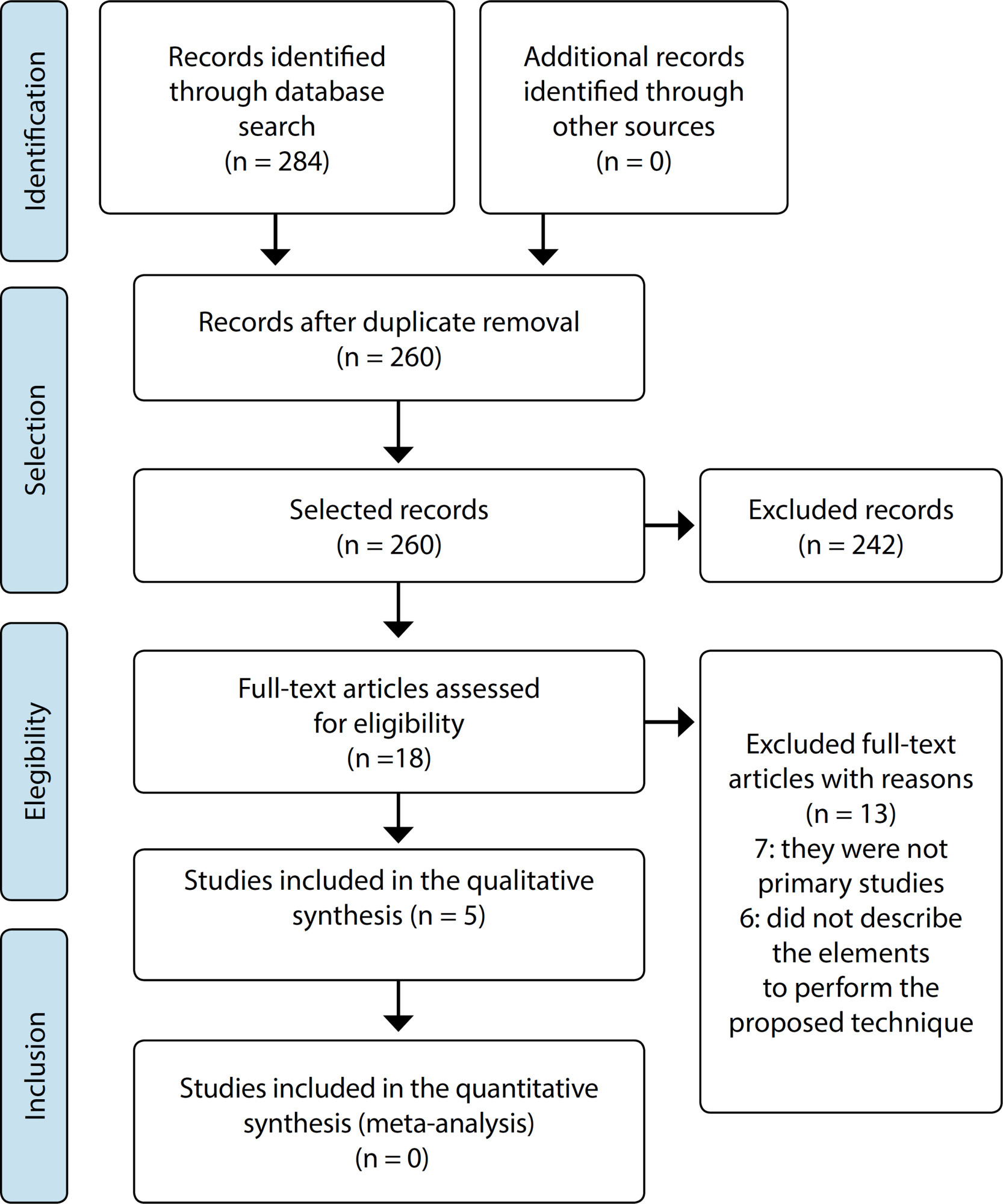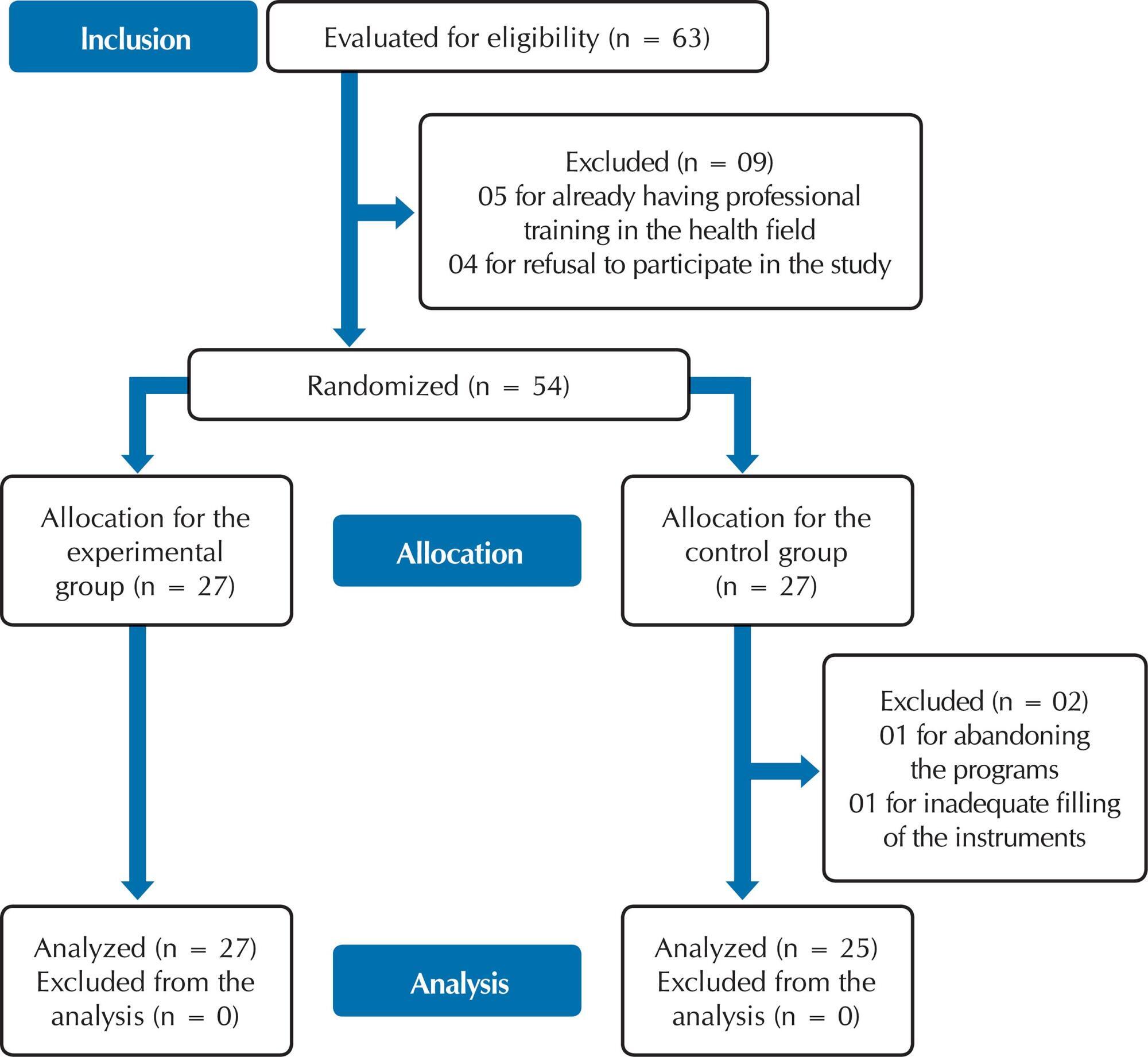-
ORIGINAL ARTICLE
Simulation-based training in Leprosy: development and validation of a scenario for community health workers
Revista Brasileira de Enfermagem. 2023;76:e20230114
12-08-2023
Abstract
ORIGINAL ARTICLESimulation-based training in Leprosy: development and validation of a scenario for community health workers
Revista Brasileira de Enfermagem. 2023;76:e20230114
12-08-2023DOI 10.1590/0034-7167-2023-0114
Views0See moreABSTRACT
Objectives:
To build and validate a clinical simulation scenario designed to instruct community health workers (CHWs) in active leprosy case detection.
Methods:
Methodological study involving the development of a simulated clinical scenario and content validation by experts. The Content Validity Index (CVI) was used to determine the level of agreement among the judging commitee, and a descriptive analysis of their recommendations was performed.
Results:
A simulated scenario with a simulated participant was developed — a simulation characterized by low complexity, moderate physical/environmental fidelity, moderate to high psychological fidelity, and high conceptual fidelity, lasting 50 minutes and capable of training up to 10 CHWs simultaneously. The scenario was validated by 14 experts, with a CVI exceeding 80% for all components.
Conclusions:
The validated clinical simulation possesses attributes that make it highly reproducible in various national health contexts, thereby contributing to the global “Towards Zero Leprosy” strategy.
-
ORIGINAL ARTICLE
Artificial intelligence in the analysis of emotions of nursing students undergoing clinical simulation
Revista Brasileira de Enfermagem. 2023;76:e20210909
04-14-2023
Abstract
ORIGINAL ARTICLEArtificial intelligence in the analysis of emotions of nursing students undergoing clinical simulation
Revista Brasileira de Enfermagem. 2023;76:e20210909
04-14-2023DOI 10.1590/0034-7167-2021-0909
Views0See moreABSTRACT
Objective:
to assess nursing students’ emotions undergoing maternal-child clinical simulation.
Methods:
an observational study, carried out between June and July 2019. The Focus Group technique was used, with 28 nursing students, randomly distributed into three groups, with qualitative (Bardin technique) and quantitative data (Artificial Intelligence) analysis, to analyze emotions through facial expressions, tone of voice and description of speeches.
Results:
we defined two categories: “It was not easy, it was very stressful”; and “Very valuable experience”. In Artificial Intelligence, emotional distribution between face, voice and speech revealed a prevalence of negative valence, medium-high degree of passivity, medium power to control the situation and medium-high degree of obstruction in task accomplishment.
Final considerations:
this study revealed an oscillation between positive and negative emotions, and shows to the importance of recognizing them in the teaching-learning process in mother-child simulation.

-
ORIGINAL ARTICLE
Management in clinical simulation: a proposal for best practices and process optimization
Revista Brasileira de Enfermagem. 2021;74:e20200515
08-16-2021
Abstract
ORIGINAL ARTICLEManagement in clinical simulation: a proposal for best practices and process optimization
Revista Brasileira de Enfermagem. 2021;74:e20200515
08-16-2021DOI 10.1590/0034-7167-2020-0515
Views0See moreABSTRACT
Objectives:
to develop a best practices document with facilitating components and processes for simulation management.
Methods:
the methodological research was conducted between April and October 2017, using four approaches: observational research, conducted in an international simulation institution; Definition of theoretical framework, from the International Nursing Association for Clinical Simulation and Learning; integrative literature review, in international databases; and comparative analysis. It used Bardin's analysis for the categorization of the information.
Results:
creation of a document with good practices in simulation regarding management and practice in simulation and management of resources and data, highlighting the use of technology and the training of professionals as the most important allies for overcoming the main limitations found.
Final Considerations:
the product of this study is a compilation of strategies for simulation management as a tool to enhance the application of the method with greater effectiveness.

-
Instructor-led oral debriefing technique in clinical nursing simulation: integrative review
Revista Brasileira de Enfermagem. 2021;74:e20190750
05-21-2021
Abstract
Instructor-led oral debriefing technique in clinical nursing simulation: integrative review
Revista Brasileira de Enfermagem. 2021;74:e20190750
05-21-2021DOI 10.1590/0034-7167-2019-0750
Views0See moreABSTRACT
Objective:
To analyze available scientific evidence in literature pertaining to the elements that make the instructor-led oral debriefing technique in clinical nursing simulation feasible.
Methods:
An Integrative literature review along the following information sources: PubMed®, Scopus, Web of Science, Literatura Latino-Americana e do Caribe em Ciências da Saúde (LILACS) [Latin American and Caribbean Health Sciences Literature], Cumulative Index to Nursing and Allied Health Literature (CINAHL), and Educational Resources Information Centre (ERIC).
Results:
284 studies were identified, and 5 composed the sample. Four elements constitute oral debriefing: characteristics of the instructor; discussion format, debriefing structure; and time frame. The main benefit was to develop cognitive and psychomotor skills; and the challenge was to establish training for instructors. The studies showed high methodological quality.
Final Considerations:
The scientific deepening as to the elements, benefits, and challenges of oral debriefing enables its execution and offers quality to the nursing process.

-
ORIGINAL ARTICLE
Clinical simulation in teaching Pediatric Nursing: students’ perception
Revista Brasileira de Enfermagem. 2020;73(2):e20180720
03-30-2020
Abstract
ORIGINAL ARTICLEClinical simulation in teaching Pediatric Nursing: students’ perception
Revista Brasileira de Enfermagem. 2020;73(2):e20180720
03-30-2020DOI 10.1590/0034-7167-2018-0720
Views0See moreABSTRACT
Objectives:
to comprehend the perception of undergraduate nursing students about learning to care for the child and family through clinical simulation.
Methods:
this is a qualitative research conducted with ten nursing students through semi-structured interviews. Data were analyzed through content analysis.
Results:
data were organized into two categories: “learning a new way to learn,” in which students describe their experiences during the simulation, and “learning a new way to care,” in which they reflect on learning through simulation.
Final considerations:
we believe that clinical simulation practice in teaching should be encouraged because of the benefits it can offer to the students, faculty, patients and their families. However, we recommend further studies to validate scenarios of child and family healthcare.
-
ORIGINAL ARTICLE
Self-confidence in the care of critically ill patients: before and after a simulated intervention
Revista Brasileira de Enfermagem. 2019;72(6):1618-1623
10-21-2019
Abstract
ORIGINAL ARTICLESelf-confidence in the care of critically ill patients: before and after a simulated intervention
Revista Brasileira de Enfermagem. 2019;72(6):1618-1623
10-21-2019DOI 10.1590/0034-7167-2018-0758
Views0See moreABSTRACT
Objective:
To evaluate the self-confidence of nurses in the care of critically ill patients, before and after a simulated intervention.
Method:
A quasi-experimental study was carried out with 103 nurses who participated in a workshop on the care of critically ill patients in the first semester of 2016. A clinical simulation pedagogical instrument was used throughout the event, and self-confidence was assessed by the Portuguese version of the Self-confidence Scale (SCSvp).
Results:
Most participants reported not being prepared to provide first care to critically ill patients, which was carried out during care practice. The participants presented a significant increase in self-confidence after the simulated intervention (p<0.001) in the cardiac, neurological, and respiratory dimensions.
Conclusion:
Simulation has proved to be an effective strategy for the development of individuals’ self-confidence, which contributes to the improvement of skills required for professional practice.
-
ORIGINAL ARTICLE
Debriefing evaluation in nursing clinical simulation: a cross-sectional study
Revista Brasileira de Enfermagem. 2019;72(3):788-794
06-27-2019
Abstract
ORIGINAL ARTICLEDebriefing evaluation in nursing clinical simulation: a cross-sectional study
Revista Brasileira de Enfermagem. 2019;72(3):788-794
06-27-2019DOI 10.1590/0034-7167-2018-0103
Views0See moreABSTRACT
Objective:
Evaluate the contribution of debriefing after clinical simulations for nursing students.
Method:
Quantitative study, conducted with 35 nursing students who participated in five clinical simulation scenarios with planned debriefings based on the model of the National League Nursing/Jeffries Simulation Theory. After the fifth scenario, students answered the Debriefing Evaluation Scale associated with the Simulation.
Results:
The items evaluated involved the psychosocial, cognitive, and affective values, and within a scale from one to five, the highest mean was found in cognitive value with 4.23 (±0.56) points, then in psychosocial value with 3.77 (±0.53), and finally in affective value with 3.71 (±0.63) points.
Conclusion:
The debriefing conducted after the clinical simulation scenarios was a reflective exercise that contributed to the student integrating multiple knowledges in affective, cognitive and psychosocial values, and thus develop the competencies required.
-
RESEARCH
Stress of nursing students in clinical simulation: a randomized clinical trial
Revista Brasileira de Enfermagem. 2018;71(3):967-974
01-01-2018
Abstract
RESEARCHStress of nursing students in clinical simulation: a randomized clinical trial
Revista Brasileira de Enfermagem. 2018;71(3):967-974
01-01-2018DOI 10.1590/0034-7167-2017-0187
Views0ABSTRACT
Objective:
To evaluate and compare the perception of stressors by nursing students before and after a high-fidelity clinical simulation or conventional laboratory practice class.
Method:
This is a randomized clinical trial conducted with 52 nursing students. Both groups had theoretical classes about cardiothoracic physical examination, followed by practice class in skill laboratory. In addition, the experimental group took part in a high-fidelity simulation scenario. Stressors were evaluated before and after class, with the application of KEZKAK questionnaire.
Results:
The experimental group was significantly more worried about six factors related to lack of competence and to interpersonal relationships (p < 0.05), while the control group was significantly more worried about being in contact with suffering (p = 0.0315).
Conclusion:
The simulation affects students’ perception of stressors and promotes their self-evaluation and critical thinking regarding the responsibility that comes with their learning.
Keywords:Evidence-based NursingNursing StudentsPsychological StressRandomized Controlled Clinical TrialSimulationSee more



